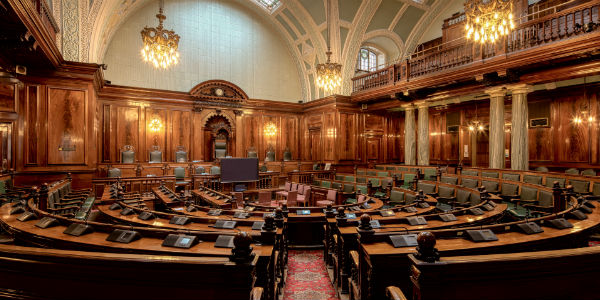How to maintain high ethical standards in local government: a perspective on the Committee on Standards in Public Life’s review so far
Colin Copus offers his perspective on some of the evidence heard so far by the Committee on Standards in Public Life’s review into ethical standards in local government. He argues that it is a difficult task to balance the issues at stake in refining the current system. There are also important arguments surrounding whether or not to nationalise or localise standards in local government. But the work of the Committee is vital if we are to maintain high standards of ethical behaviour in local government.
 Bradford City Hall. Photo by Michael D Beckwith on Unsplash
Bradford City Hall. Photo by Michael D Beckwith on Unsplash
As academic advisor to the Committee on Standards in Public Life’s review into ethical standards in local government, I’ve been reflecting on the evidence I’ve heard so far. The aim of the review is to test the robustness of the current system for maintaining high standards of public behaviour in local government. It is not a hatchet-job on councillors or intended to identify a problem where there is not one. Rather, the review will assess evidence to enable a judgement to be made about what, if any, changes are required to the current regime to ensure the maintenance of the highest ethical standards in local government.
My impression so far is that there are two competing themes emerging that pose a challenge to anyone considering how best to create the environment for strong ethical behaviour in local government. Those themes result in the question: do we nationalise or do we localise ethical standards in local government?
The danger in any review in local government is for rose-coloured spectacles to temper one’s view of past systems. It is nowhere more the case than in the ethical standards debate. The evidence received by the Committee so far has highlighted some difficulties with the effectiveness of localising standards that came with the abolition of the standards board and the past regime associated with the board by the Localism Act 2011. Concern has also been expressed about placing control over the ethical regime (and code of conduct) with councils themselves and about the apparent weaknesses in the sanctions available to councils when dealing with ethical and behavioural issues. Moreover, the review has heard that local codes of conduct can result in councillors who sit on county, district and parish councils at the same time potentially being subject to three different codes. We do not yet know how widespread this issue is or if it generates regular and intractable problems for councillors and officers.
But the review has also heard that there is a recognition that centralising and nationalising ethical standards can result in a system that is remote, anonymous, lacking in appreciation of local differences of culture, tradition and behaviour. Nationalising the system also prevents flexibility and responsiveness to specific local issues and at worse can result in councillors feeling on ‘trial’ and subject to a remote and bureaucratic system, which in itself can damage local democracy.
The issue of sanctions also looms large as does the role of independent input or oversight of the local process of assessing standards issues. Sanctions pose a particular problem, not least because under the current arrangements, a party in power may be tempted to misuse their majority when imposing sanctions, but also because there is a line between what is appropriate for councils to be able to require and impose as sanctions and what is appropriate that the electorate themselves have at their disposal. The question of sanctions is closely tied to that of oversight: even the power to suspend councillors from committees, council meetings or council premises and restrict resources for a short while may be subject to misuse. Robust safeguards and rights of appeal must, therefore, be available to councillors whose behaviour is not the real problem – but instead find themselves the subject of a complaint when they are an effective and vocal opponent of the ruling administration. We also do not yet know how widespread such a problem may be. It is clear that the issue of sanctions, the system by which they are imposed and independent oversight and involvement, will be a key theme of the Committee’s assessment of the evidence in this review.
The hazard with any ethical regime – local or national – is how the political parties in local government respond to that regime. Given that over 90 per cent of all councillors in England are from the Conservative and Labour parties and the Liberal Democrats, the temptation to use a set of rules and regulations designed to control councillors’ behaviour for party political advantage or to silence councillors from other parties, is considerable. Any ethical regime must not provide a system that can be misused for party advantage or by officers to restrain troublesome councillors as both can damage free speech within local democracy. It must also be remembered that ethical standards in English local government are among the highest across Europe and that results in a commitment by the overwhelming majority of councillors to public service and the public wellbeing. The Committee has a difficult tightrope to walk to make observations and recommendations that provide an opportunity for all local authorities and the central government to finesse and reform the current system, to ensure the highest standards of ethical behaviour are maintained and strengthened in local government. It is well worth the walk.
This post represents the views of the author and not those of Democratic Audit.
About the author
 Professor Colin Copus is a specialist advisor to the Committee on Standards in Public Life’s review into local government ethical standards. He writes here in a personal capacity.
Professor Colin Copus is a specialist advisor to the Committee on Standards in Public Life’s review into local government ethical standards. He writes here in a personal capacity.





 Democratic Audit's core funding is provided by the Joseph Rowntree Charitable Trust. Additional funding is provided by the London School of Economics.
Democratic Audit's core funding is provided by the Joseph Rowntree Charitable Trust. Additional funding is provided by the London School of Economics.